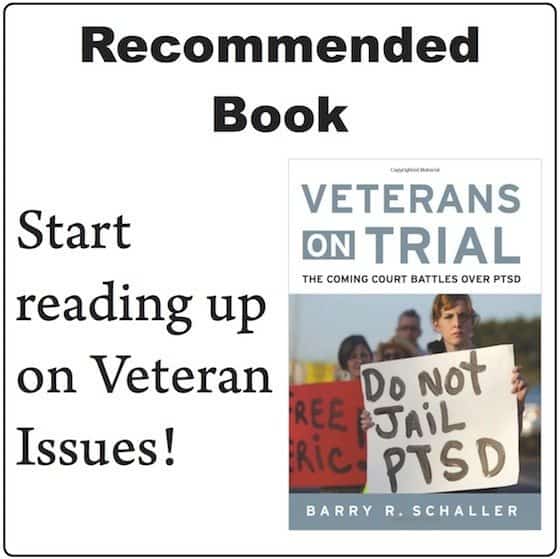MMQB: Is Military Service a Life Sentence?
It is the gift that keeps on giving. Following service, many military veterans are forced to not only bear the burden of disability but also bias in the court system and employment.
But the tide is changing. Many veterans are moving to the forefront in policy and law to address these issues head. The move runs across the spread of civil and criminal law in America as well as employment. Law is the topic this week on DisabledVeterans.org.
Hi and welcome to another edition of Monday Morning Quarterback for Veterans. This week I decided to talk about problems veterans face while seeking justice in the courts and also employment.
Some of you may be aware that veterans suffering from mental illnesses from service are also being dinging in courts as being unfit parents, unfit people, unfit criminals, unfit business owners, and generally just being unfit.
Sadly, this is another symptom of America sending its sons and daughters off to war without wanting to face the unfortunate reality that war has a real human cost. We still, after over 200 years following being founded from a war, have yet to address the real after effects on our culture.
A “just society,” and for you Christians out there, a “Christian” society, would be willing to clean up its messes. (So would many of our children after being asked.) This would include the human harm caused by war. Veterans involved in that system are giving it their all to right the wrongs.
I’m going to keep this one a little shorter than normal and just give resources for you to evaluate on your own. I think the text below is important and a must read for any veteran.
Here’s what I’ll cover today:
- Veterans on Trial: The Coming Court Battles over PTSD
- Employment and the PTSD ghost
- What you can do
Veterans on Trial
A friend introduced me to the new book Veterans on Trial. It is a must read for veterans and advocates trying to help us.
Veterans on Trial covers the myriad of problems veteran face when returning from war with America’s legal system. The topics range from divorce, job loss, homelessness, substance abuse, suicide, and criminal issues like murder.
The author, Barry Schaller, is a lecturer at Yale Law School. He is a retired Connecticut Supreme Court justice and author. He lectures on Public Law and Ethics, Bioterrorism, Human Research Ethics, and the Law. He is what we call a smart dude.
This one is my next read on a very long list. Here is what is on Amazon about the book:
Experts anticipate that more than 350,000 veterans of the wars in Iraq and Afghanistan will return to civilian life with posttraumatic stress disorder (PTSD). Barry R. Schaller, a judge and a bioethicist, chronicles the events leading to what he predicts will be the most challenging PTSD epidemic in U.S. military history. Although combat veterans have experienced similar disorders in previous wars, Schaller explains why these two contemporaneous wars in particular are a breeding ground for the condition.
Veterans on Trial deals with the problem of PTSD from the ground up, starting with the issues that returning veterans and their families face. When they leave the battlefield to become civilians again, many soldiers are not prepared, or are unable, to cope successfully with the challenges. Their compounded anxieties often result in serious trouble: divorce, job loss, homelessness, substance abuse, suicide, and even murder. Schaller also explains how PTSD now operates as a means of defense in the criminal court system and how it will affect the courts in the next decade.
After unveiling this invisible injury among the walking wounded, Schaller offers far-reaching solutions for returning veterans and their families. He specifies what political and judicial officials, military leaders, legislators, and the mental health communities can do to meet their responsibilities to the men and women who serve our nation.
I have had my own degree of run-ins and biases against me for the fact of being a disabled veteran. Many individuals find it hard to believe that an enlisted guy with a disability can make it through college and through law school.
In reality, there are tons of veteran who go on to get advanced degrees. However, the American discourse is such that civilians still find it surprising.
And it is just this “surprise” we are trying to change.
The PTSD Ghost and Employment
For years, I have heard that certain high level companies are reluctant to hire war veterans for fear of the “unseen disabilities” some veterans have. Apparently, these hiring managers have watched too many reruns of A-Team.
However, A-Team or not, many hiring agents still refuse to hire veterans for this reason. My old Voc Rehab Counselor confirmed that many Chicago firms refuse to hire vets for that reason. And, even if they did hire veterans, they tended to be slow on the draw in how to deal with veteran related issues.
Personally, I had a struggle with my first employer out of college. One manager used the term “kill ratio” during a business meeting to brag about his high sales rate. I, of course, had a visceral reaction to use of this term because it is offensive when used by a non-veteran in that kind of context for me, at least. So, I accidentally spit up due to my own reaction.
Of course, this point was missed by the employer, and I did get my butt chewed afterward.
But the bigger issues with employment revolve around real disabilities and how to treat veterans. Many employers have been noted to ask vets to just “suck it up” without a real adult approach to providing accommodations in line with the ADA. Now, 14 years after my own separation from service, companies are taking the ADA more seriously.
Still, employers are rumored to dismiss veteran applicants for the above reasons, despite a peculiar reality; veterans are not the only disabled people in the workforce. In fact, there are many more millions of disabled civilians in the workforce than disabled veterans. Sadly, veterans tend to get the bad wrap.
This is a strange fact that the stigma of PTSD seems to miss. PTSD is not exclusive to military no more than traumatic brain injuries or bad backs. In all instances, many more civilians than military veterans have the conditions. These same individuals are in the workforce in ratios that dwarf the relative number of veterans with the same conditions.
Nonetheless, as a group, “military veterans” is the hiring group tagged with the stigma. Perhaps the reason is because this same group was in combat, and most uneducated civilians believe that anyone who is trained to “kill” has an actual “kill ratio.”
Maybe they are afraid we may turn at the drop of a hat with no warning. Ridiculous.
The National Security Problem with America’s Messes
The real problem with the stigma has more to do with the implication. Like problems with law, America’s inability to grow up and treat veterans fairly has a huge impact on our nation’s ability to recruit top talent from across the socioeconomic spectrum.
If many families with options want their children to succeed, why would they encourage military service? Aside from “patriotism,” these same families would probably not encourage service due to the impact of service and the handicaps veterans face later.
In today’s examples alone, veterans face enormous hurdles in matters relating to law and employment. Beyond these two things, I cannot imagine bigger detractors beyond the obvious risk of death or lifelong disability.
For these reasons, it is imperative that military veterans across the country get involved in local and national politics because we need to help our nation grow up. We need to help our nation understand that war is messy both on the battlefield and afterward.
In order to maintain our superior military forces, we need the best recruits we can get. To do this, we need to bolster the voices that are pushing America to own up to its responsibilities.
Doing so will make military service something that should not be feared, at least when you return from service.
For those readers who can, please make a point to support your local veteran-owned-business or run for local office in your community.
Hire more veteran employees into places of upper management. Contribute more to training and outreach in your local community.
Pick the veteran accountant or attorney if you have an option. Do your part to support your own and in so doing to support the nation moving forward.
And until next time, have a good week.




I am a vietnam veteran who went to college and earned a business degree at a very good university after my hitch in the Navy. I remember always being advised by various councelors not to include a word about being in the service on my resume. To not even account for that time period. To make it appear I went to college right after high school. This is when the draft was on and many of us had no choice if we did not go to college and stay in college to avoid being drafted. The ‘word out’ was just to avoid mentioning it because, after all, we were all insane of course.
Then I learned that most everyone in the business world were total ass_____s.
Great article, but it can be summed up pretty succinctly with: “The USA continues its long time practice of eating the best and brightest of its young.” Until that ingrained practice is changed, it will be very tough to change the bigotry facing all veterans.
Outstanding write up Ben! I , personally have been through the corporate world, and NONE of them (co-workers or upper mgmt) could understand why I do things differently than the rest…or why my VA prescribed meds. made me extremely tired. Legal issues, all due to my binge drinking…I will most certainly buy the book! Sounds like me to the T
Maybe it is just me, because I am no longer in the work force, and consequently no longer directly affected, but the employer bias against vets seems less now than when I returned from Vietnam. In those years, I was asked more than once by employers or potential employers about how it “felt” to take human life, or how many human beings I had killed. I don’t believe the bias is that crude or open today. Now, I even see employers advertising that they WANT to hire vets. That NEVER happened after Vietnam. Even the federal government would not easily hire vets then, and if they did, it was under some sort of special category hire with lots of outs for the employer to rid themselves of any vet who had special needs BECAUSE OF their service. Nothing is good or fair for military vets today, but it seems to me to be a little better than after Vietnam. Poco y poco as they say in the old country. Or, as MLK famously quoted, the arc of the moral universe is LONG, but it tends toward justice. Upper case emphasis is mine.
NOT ONLY FOR OUR VETS, BUT FOR ANYONE CONCERNED ENOUGH TO WANT TO HELP. WE ARE ALL IN THIS THING CALLED “LIFE” TOGETHER.